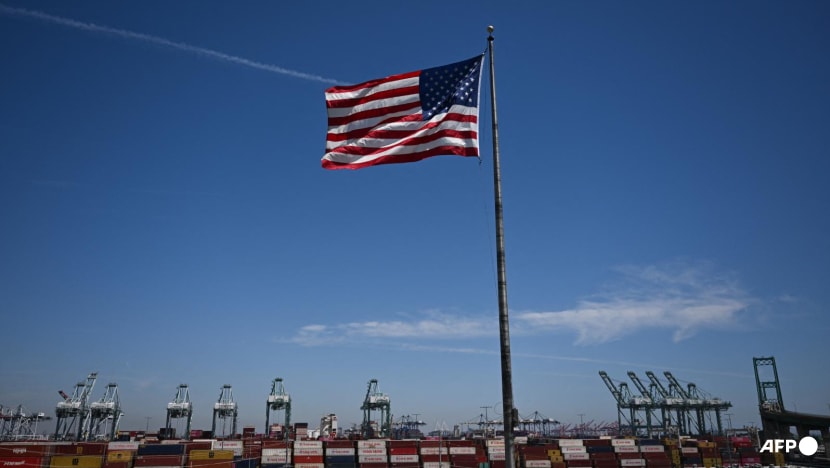Why countries like China, Canada and the UK have issued new warnings about US travel

A United States flag blows in the wind at the Port of Los Angeles in San Pedro, California, on Apr 10, 2025. (File photo: AFP/Patrick T Fallon)
SINGAPORE: Several countries have issued new advice and warnings about travelling to the United States in recent weeks, with China joining in on Wednesday (Apr 9) by telling its citizens to "fully assess the risks" of visiting the US before they head there.
Canada and European countries like the United Kingdom, Germany, Denmark and Finland have also given their citizens new guidance on visiting the US.
This comes after US President Donald Trump, in the early months of his second term, announced a number of immigration-related executive orders that focused on border policies, visa vetting procedures and undocumented migrants in the US.
The latest move by China also comes amid a trade war sparked by Trump's "Liberation Day" tariffs, announced on Apr 2, which slapped a baseline 10 per cent tariff on all imports, with higher levies on imports from some trading partners.
Here's what's been fuelling concerns about travel to the US in these countries:
DETERIORATING RELATIONS WITH THE US
While Trump has since announced a 90-day pause on most of the heftier tariffs, he doubled down on China, and the two countries have been trading tit-for-tat tariff hikes.
On Wednesday, China warned tourists to "fully assess the risks" before travelling to the US, after Beijing raised tariffs on American imports in retaliation for similar duties imposed by Trump.
"Due to the deterioration in China-US trade relations and the domestic security situation in the United States, (we) advise Chinese tourists to fully assess the risks before travelling to the US," Beijing's culture and tourism ministry said in a statement.
THE DETENTION OF VISITORS
In March, the UK revised its advice for citizens travelling to the US to include a warning that anyone found breaking its entry rules could face arrest or detention.
The current British travel advice for the US, published online by Britain's foreign office and most recently updated on Mar 14, states: "You should comply with all entry, visa and other conditions of entry. The authorities in the US set and enforce entry rules strictly. You may be liable to arrest or detention if you break the rules."
At the beginning of February, the guidance had only stated: "The authorities in the US set and enforce entry rules."
The foreign office declined to comment on the reason for the revision or confirm when exactly it took place. It said its travel advice was designed to help people make decisions and that the advice was constantly kept under review.
Earlier in the month, in response to reports that a woman had been detained in the US for more than 10 days over a possible breach of her visa conditions, the foreign office confirmed that it was providing support to a British national detained in the US.
The woman has since returned to Britain.
Similarly, in March, Germany updated its US travel advisory to emphasise that a visa or entry waiver does not guarantee entry after several Germans were detained while entering the country.
Germany's foreign ministry updated its travel advice website for the US on Mar 11 to clarify that neither approval through the US Electronic System for Travel Authorization, or ESTA, system nor a US visa entitles entry in every case.
"The final decision on whether a person can enter the US lies with the US border authorities," said a German foreign ministry spokesperson, who emphasised that the change did not constitute a travel warning.
INCREASED SCRUTINY FROM US BORDER OFFICERS
The Canadian government updated its US travel advisory on its website in March to say that those who plan to visit the US for more than 30 days "must be registered with the United States government", NPR reported.
Those who did not do so could face "penalties fines, and misdemeanour prosecution", the Canadian government said.
In early April, it updated its advisory again, adding a new paragraph about scrutiny at points of entry into the US, Canadian public broadcaster CBC reported.
This was done "quietly", CBC said.
Part of the new paragraph reads: "Expect scrutiny at ports of entry, including of electronic devices. Comply and be forthcoming in all interactions with border authorities. If you are denied entry, you could be detained while awaiting deportation."
CBC noted that US border agents had long had the power to ask to search travellers' belongings and demand access to their electronic devices.
However, it reported that security had been stepped up at the US-Canada border, citing an immigration lawyer.
"There's been much more heightened security and heightened investigations at the border," the lawyer told the broadcaster.
CHALLENGES FOR SOME LGBTQ TRAVELLERS
In March, several European countries including Denmark, Finland, France and Germany suggested that transgender, non-binary and intersex people may face difficulties when trying to enter the US.
The Danish foreign ministry changed its US travel advisory to say that transgender people should contact the US embassy in the Nordic country before travelling to the United States.
"When applying for an ESTA or visa to the United States, there are two gender designations to choose from: Male or female," the travel advisory stated on Mar 21.
"If you have the gender designation X in your passport, or you have changed your gender, it is recommended that you contact the US embassy prior to travel for guidance on how to proceed," the ministry added.
The "X" gender marker is preferred by many non-binary people, who do not identify as strictly male or female.
While the travel advisory did not explicitly mention the Trump administration, it came only weeks after Trump signed an executive order calling for the US federal government to define sex as only male or female and for that to be reflected on official documents, such as passports, and in policies.
The US State Department has stopped issuing travel documents with the X gender marker.
The department also stopped allowing people to change the gender listed on their passports or get new ones that reflect their gender rather than their sex assigned at birth.
Finland also advised prospective US travellers on its foreign ministry homepage that if their "current gender as recorded in their passport differs from the gender they were assigned at birth, US authorities may deny (them) entry".
"It is recommended that you check with US authorities in advance for entry requirements," the ministry said.
France, meanwhile, modified its official advice to its nationals who are travelling to the United States, warning they must now state their gender assigned at birth in visa or ESTA applications.
In advice similar to that issued by Denmark, Germany told travellers who have the X gender entry in their passport or whose current gender entry differs from their gender entry at birth to contact a US diplomatic mission in Germany before they enter the country.
This is so that they can "find out the applicable entry requirements" for the US, the German foreign ministry said.



















